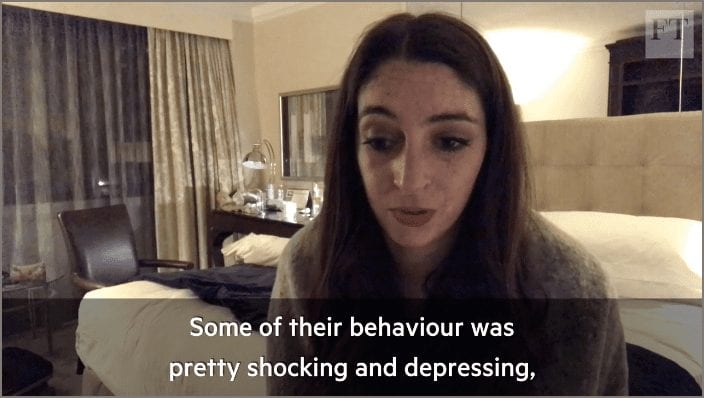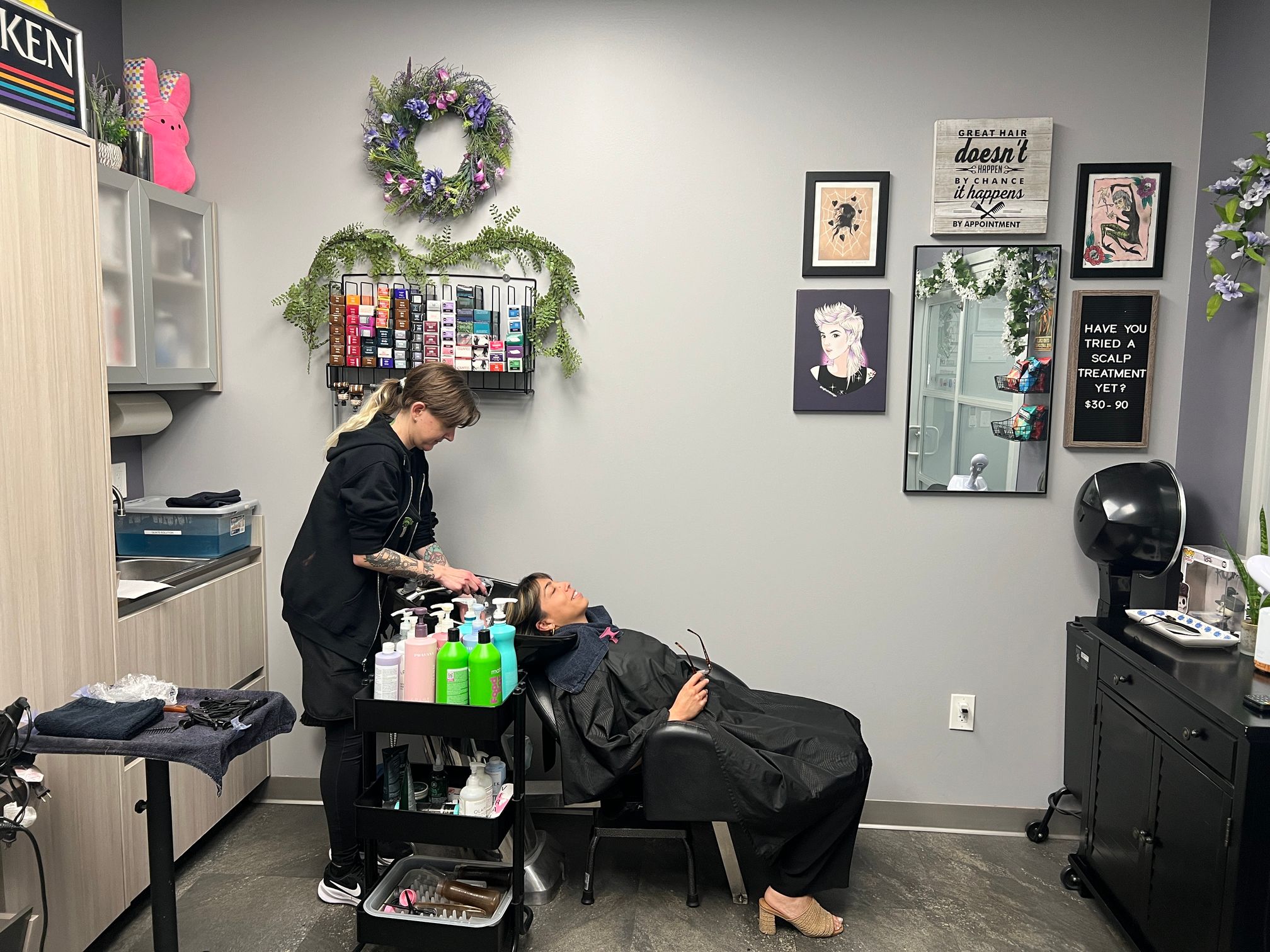The video that accompanied the Financial Times’ story included video testimonial from Marriage immediately following the event. (Image: Financial Times)
On January 23, 2018, the Financial Times broke open a story of scandal and misogyny with the publication of “Men Only: Inside the charity fundraiser where hostesses are put on show.”
Journalist Madison Marriage, who was working as an accounting and tax correspondent for the paper, caught wind of rumors that the annual Presidents Club Charity Dinner — a fundraiser to benefit childrens’ hospitals — was a convenient cover for a men’s-only night of groping and harassment. Participants reputedly included men in entertainment, finance, business, and politics.
Approximately 130 hostesses — two, including Marriage, were undercover reporters from the Financial Times — were hired for around $200 each to work the evening’s events. Marriage outlines in the FT piece that they were told to wear black underwear and high heels, make themselves up as if they were going to a “smart sexy place” and that tight, short black dresses with corseted belts would be provided. The hostesses came from a number of backgrounds — dancers, models, actresses, students working for extra cash, aspiring lawyers and marketing executives, film producers. “Ambitious young women,” Marriage described them in an interview with BBC Newsnight.
In the same interview, Marriage described the scene. “Incredibly loud, a huge amount of testosterone in the room. Excitable, I suppose.” The hostesses were encouraged to drink that night, something Marriage was told was uncommon for most gigs like this.
When the BBC host suggested that the hostesses might have been able to “expect what they were getting,” Marriage clarified that she was warned the men might be “annoying,” but the reality was that a number of other hostesses were groped — from hands on hips, to hands up skirts. A woman was asked if she was a prostitute, another ordered to take off her underwear and dance on a table. A third told Marriage that one of the men exposed himself to her. Some were propositioned.
While the event went on — Marriage worked a 10-hour shift and arrived back to her hotel around 3 a.m. — the agency that hired the hostesses kept strict control over them. Women were followed to the bathroom and asked where they were going, told to be quick to get back to the crowd. As she worked the event, Marriage would try to quickly move away from men who attempted to grope her.
Around the venue videos of kids in intensive care played on screens and at the silent auction attendees bid on lunch with Boris Johnson, a night at a strip club, and plastic surgery packages — “This is what your missus could look like. Who’ll give me ten thousand pounds?” an announcer can be heard saying in FT’s undercover video footage. That night, the event raised £2 million, according to the FT article.
A few days after the event, the story went live and was met with immediate action: Then Prime Minister Theresa May issued a statement saying she was appalled by reports of the event, where one of her ministers was reported to be in attendance. Two of the hospitals that received charitable donations from the event returned them. And the House of Commons launched an investigation, since some of its members were thought to have been in attendance.
For this story, going undercover was necessary. In a FT video that follows the reporting process, Marriage says, “I have no other way of going in, as women aren’t welcome as guests.”
She added: “I knew that stuff like that might happen on the night, but I wasn’t sure,” Marriage said, noting that they had been tipped off by women who had been hostesses at the event over the last decade. “There were plenty of women there who had no idea that this was the kind of event it would be.”
Marriage’s work and the risks she took to report the story exposed a prestigious 33-year event as a bacchanalian flex of money and power, including participants with some of the biggest influence in England. Breaking a controversial story that exposed powerful men came with another set of risks, apart from the groping and solicitation. A piece published in the Press Gazette outlines statements Marriage made at a Women in Journalism “How to Break a Big Story” panel in October 2018 about being the target of online trolling after the story published.
Marriage and the publication received a huge volume of calls, hate mail, phone calls and threatening tweets in the aftermath. She was scared, going so far as to look at the photos of her online trolls in case she recognized them on the street. Worried about her security, she asked a colleague if she should consider installing alarms and extra locks. He reassured her that no European journalists have been killed since WWII. Then, in the months following, three female journalists were killed across the EU. Investigative journalist Jan Kuciak was shot;,Daphne Caruana Galizia — another investigative journalist –was killed by a car bomb, and Swedish journalist Kim Wall was murdered by the subject of her story.
She was advised not to answer her phone, because colleagues had received abusive calls meant for her, and she received security advice telling her to take off into the countryside for a while. Marriage went away for a week.
Her Twitter bio now labels her an investigative reporter, and her recently published work for FT re-enforces this. She appears to be leaning into her success with the Presidents Club piece and embracing the risks that come with investigative reporting — most recently, she dove into the “darker side” of Lawrence Jones, a British tech baron facing allegations of sexual abuse and workplace misconduct. Jones stepped down just days after the piece was published, according to the Financial Times.


